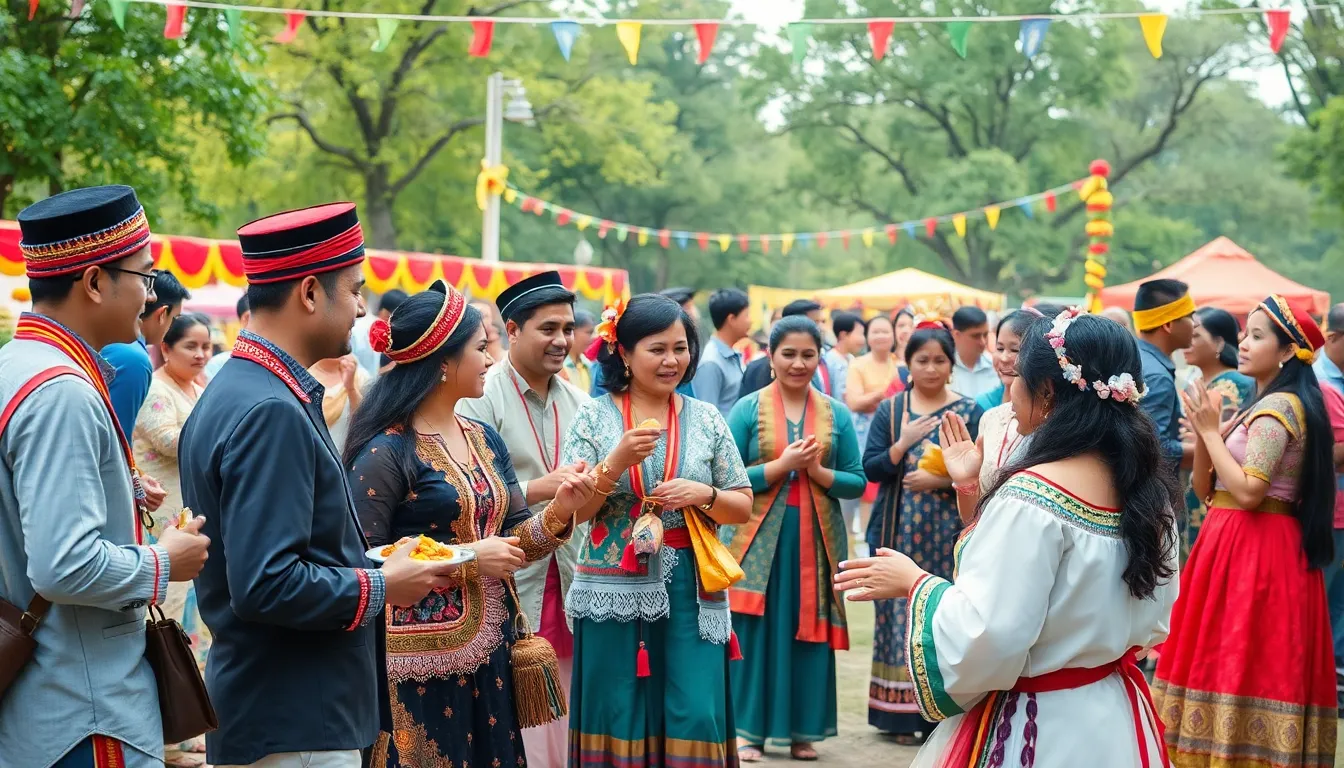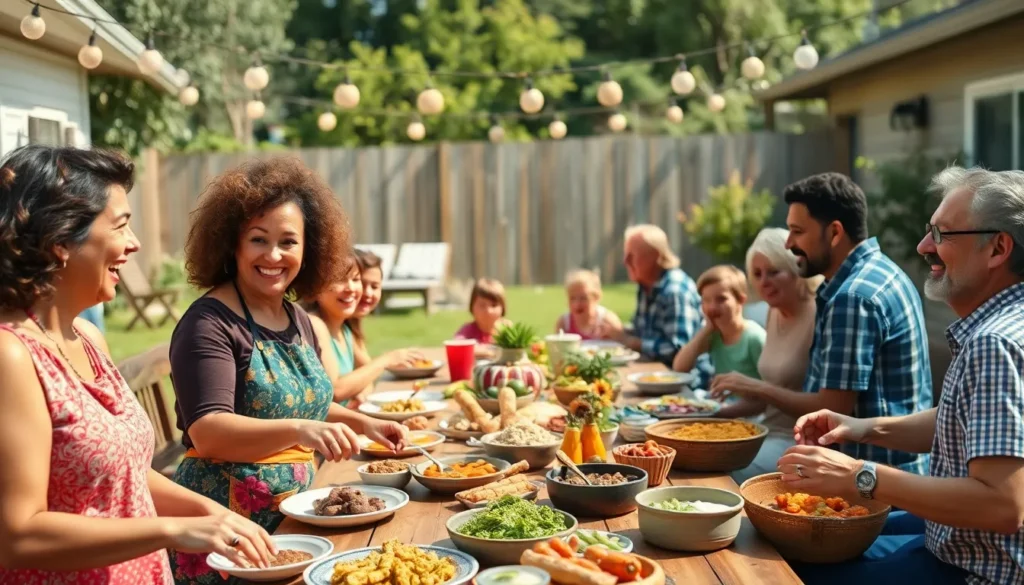Societal traditions shape the fabric of our lives, weaving together the colorful threads of culture, history, and identity. They’re the quirky customs that make family gatherings memorable and the rituals that turn holidays into cherished events. From the bizarre to the beautiful, these traditions often leave people scratching their heads while simultaneously warming their hearts.
Imagine a world without the annual turkey showdown or the awkwardly enthusiastic dance-offs at weddings. Traditions not only provide a sense of belonging but also spark joy and laughter, reminding everyone that life’s too short to take too seriously. Dive into the fascinating realm of societal traditions, where every custom tells a story and every celebration is an invitation to join the fun.
Table of Contents
ToggleUnderstanding Societal Traditions
Societal traditions connect individuals through shared practices and beliefs. Many customs play vital roles in daily life, shaping communities and personal identities. Celebrations like weddings, births, and religious ceremonies often serve as focal points for these traditions. They create bonds among family members and friends while preserving cultural narratives.
Cultural narratives, expressed through rituals, vary widely across different societies. Food traditions, for instance, reflect historical influences and regional ingredients. Festivals, like Diwali or Thanksgiving, highlight unique values and beliefs, reinforcing community ties. Participation in these events fosters a sense of inclusion and belonging.
Identifying specific customs reveals the evolution of societal values over time. Customs such as storytelling pass down wisdom and heritage from one generation to the next. Through these practices, societies maintain historical continuity while adapting to modern influences. Rituals, including holiday celebrations, not only commemorate events but also create opportunities for collective joy.
Appreciating diverse traditions enhances understanding of different cultures. Engaging in various practices can lead to broader perspectives and experiences. Observing local customs, such as traditions surrounding grief or friendship, helps build empathy and respect. By embracing these differences, a richer societal fabric emerges.
Each tradition has its unique story, reflecting the journey of a community. Recognizing the importance of these stories nurtures connections and enriches personal experiences. Traditions offer a lens through which individuals can view their history, identity, and place within society.
The Role of Societal Traditions

Societal traditions play a critical role in fostering connections and cultural identity.
Influencing Cultural Identity
Cultural identity relies heavily on traditions that create a sense of belonging. Customs passed down through generations shape how individuals perceive themselves and their communities. Participation in traditional events, such as festivals and family gatherings, reinforces individuals’ connection to their heritage. Celebrating unique cultural practices highlights distinctive traits within communities, preserving historical narratives and promoting diversity. Shared traditions cultivate understanding and appreciation among different groups, enhancing the richness of societal experiences.
Shaping Social Norms
Social norms often stem from the traditions that define a community. These customs establish expectations for behavior, guiding individuals in their daily lives. Through rituals and ceremonies, members of society learn to appreciate core values such as respect, loyalty, and empathy. Regular engagement in communal activities fosters collaboration and mutual support, strengthening relationships among individuals. As cultural contexts evolve, traditions may adapt but continue influencing social expectations. Diverse practices contribute to a dynamic societal framework that embodies collective identity and shared values.
Types of Societal Traditions
Societal traditions encompass a variety of practices that strengthen community ties and cultural identity. Two significant categories include rituals and celebrations, as well as customs and practices.
Rituals and Celebrations
Rituals and celebrations mark important life events and seasonal changes. They serve as opportunities for family and community members to come together and experience collective joy. Weddings symbolize the union of two individuals, while births celebrate new life entering a family. Religious ceremonies reinforce spiritual beliefs and shared values. Festivals, like harvest celebrations, highlight local customs and community heritage. Each tradition, whether elaborate or simple, fosters a sense of belonging and unity among participants.
Customs and Practices
Customs and practices shape daily life and reflect cultural values. Eating together during meals signifies family bonding and promotes harmony. Dress codes during specific occasions embody cultural identity and historical significance. Language and storytelling practices pass down wisdom and reinforce community ties. Specific greetings and gestures demonstrate respect and social connectivity. By engaging in these customs, individuals contribute to the preservation of their heritage, ensuring that traditions remain vibrant and relevant across generations.
The Impact of Modernization on Societal Traditions
Modernization influences societal traditions significantly, prompting shifts in practices and beliefs.
Preservation vs. Adaptation
Traditions face the challenge of preservation and adaptation in an ever-changing world. Some customs remain vital as communities retain their historical relevance. Others adapt, integrating modern values while honoring their origins. Families often negotiate these changes, blending old practices with new expectations. Preservation fosters a sense of continuity amidst transformation, allowing traditions to evolve without losing their essence. Communities must carefully balance respect for history with the need for cultural relevance in contemporary society.
Globalization and Cultural Exchange
Globalization accelerates cultural exchange, significantly impacting traditions worldwide. Exposure to diverse customs enriches local practices, leading to unique hybrid traditions. Many individuals embrace new influences while maintaining their cultural roots, creating a dynamic social landscape. As people travel and connect online, shared experiences become more common, further blending traditions. This interconnectedness fosters empathy and understanding among different cultures, highlighting the importance of mutual respect. The evolution of societal traditions reflects a vibrant tapestry shaped by many voices and experiences.
Societal traditions play a crucial role in shaping cultural identity and fostering community connections. They provide a sense of belonging and continuity that enriches personal experiences and strengthens relationships. As individuals engage with these customs, they not only preserve their heritage but also adapt to the evolving landscape of modern society.
The interplay between tradition and contemporary values highlights the dynamic nature of culture. Embracing both historical practices and new influences allows for a vibrant exchange that enhances understanding and empathy among diverse groups. Ultimately, societal traditions serve as a foundation for shared values and collective identity, ensuring that the stories and wisdom of the past continue to resonate in the present and future.





